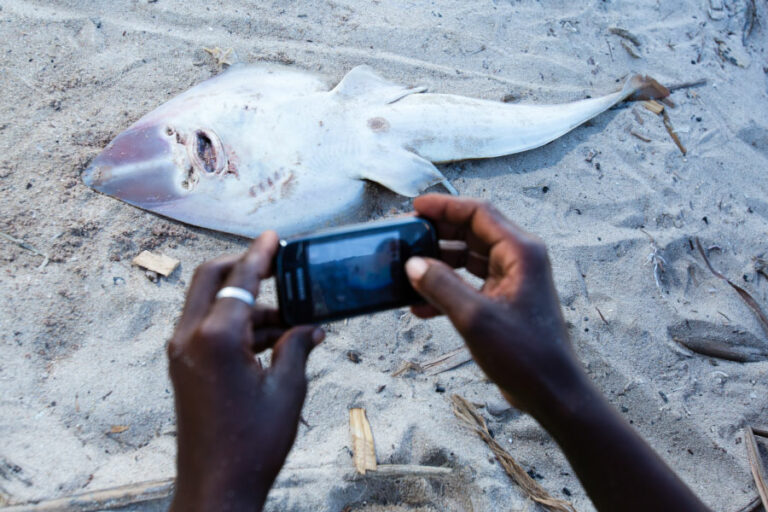New research published in the journal Marine Policy demonstrates the promise of smartphones as a useful tool for small-scale fisheries data collection in low-income countries.
Describing the results of a project conducted by Blue Ventures between 2013 and 2016 in southwest Madagascar, the study shows the potential for smartphones and the Open Data Kit (ODK) software to assist fishing communities with the collection of shark landings data.
The study also compares the relative merits and challenges of smartphone data-collection versus paper data-collection for collecting fisheries data, building on previous Blue Ventures research.
During the smartphone trial, thirteen community members were trained as data collectors across eight coastal villages in the Velondriake region, home to one of the largest concentrations of traditional shark fishers. They were trained in how to use smartphones to capture data on the number, location, size and species of sharks being landed.
Despite some challenges in uploading data to the cloud immediately, due to an unreliable 2G mobile network, the trial highlighted numerous advantages of smartphones over paper-based data collection in preventing user-error. For example, numerical measurements were automatically validated; drop-down lists prevented locations from being misspelt; and images were captured and linked to each shark record to verify species IDs.
In southwest Madagascar, as in many low-income coastal states, sustainable small-scale fisheries management is critical to economic and food security. Yet despite generating employment for 90% of those working in the fishing capture industry, most of the world’s small-scale fisheries are data deficient, hampering effective management and limiting access to certification schemes such as the Marine Stewardship Council (MSC).
Working closely with fishing communities to develop innovative data collection methods is critical to understanding fish stocks and empowering community members to monitor and co-manage fisheries, something that is particularly pertinent given the recent implementation of the Voluntary Guidelines for Securing Sustainable Small-scale Fisheries in the Context of Food Security and Poverty Eradication.
Many of the world’s small scale fisheries are in remote regions and suffer from a real lack of quality data hampering accurate management. Smartphones and ODK proved relatively easy to use and low cost. Importantly, they allowed communities to collect their own data, to inform their decisions about managing their fisheries. We learnt some really important lessons during the trial which are applicable to anyone wishing to speed up data collection and analysis, and engage community members in conservation. Most recently, we have expanded the ODK based mobile monitoring system to fishing communities in Timor-Leste where it is playing an important role in empowering women to become involved with fisheries resource management.” – Victoria Jeffers, Conservation Programmes Manager and lead author.
Blue Ventures has since expanded the ODK and smartphone system to a range of contexts from the shores of east Africa to the islands of the coral triangle, and from use by coastal communities to monitor fisheries landings, to gathering feedback from ecotourists and even registering attendance at community health clinics.
Read the full paper here: Trialling the use of smartphones as a tool to address gaps in small-scale fisheries catch data in southwest Madagascar
—
Find out more about ODK and our mobile fisheries monitoring programme here
—
Download Blue Ventures’ ODK toolkit








